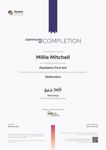Cell Biology and Biomolecules
Accredited By CPD | High-quality Materials | Video Lessons | Lifetime Access | 24/7 Tutor Support
NextGen Learning
Summary
- MCQ/Assignment (included in price)
- Tutor is available to students
Add to basket or enquire
Overview
Have you ever wondered why some fruits turn brown after being cut? Or why dough rises when left to rest? These are just a couple of examples of how biochemistry plays a role in the food we eat.
Learning Outcomes:
- Understand the basics of biochemistry and its applications in the culinary world.
- Learn about the structure and function of cells and organic molecules.
- Gain knowledge about proteins, nucleic acids, and genetics.
- Understand how metabolism works and how it affects food.
- Analyse the chemical reactions that occur during cooking and how they impact the quality of food.
- Develop a deeper understanding of the science behind food and how it can be used to create new recipes.
Assessment details
MCQ/Assignment
Included in course price
CPD
Course media
Description
Biochemistry is the study of the chemical processes that occur in living organisms. This course will provide you with a foundation in the principles of biochemistry and its application in cookery. You will learn about the building blocks of life, such as cells and organic molecules, and how they interact with each other. The course will also cover topics such as proteins, nucleic acids, genetics, and metabolism.
Throughout the course, you will analyse the chemical reactions that occur during cooking and understand how they impact the quality of food. You will learn about the science behind food and how it can be used to create new recipes. By the end of the course, you will have a deeper understanding of the science behind cookery and how it can be used to create delicious, nutritious meals.
Enrol in this course to gain a deeper understanding of biochemistry and how it applies to cookery.
Certification
Upon completion of the course, learners can obtain a certificate as proof of their achievement. You can receive a £4.99 PDF Certificate sent via email, a £9.99 Printed Hardcopy Certificate for delivery in the UK, or a £19.99 Printed Hardcopy Certificate for international delivery. Each option depends on individual preferences and locations.
Who is this course for?
- Individuals interested in the science behind cooking.
- Chefs and cooks looking to expand their knowledge of food science.
- Students studying food science, nutrition, or biochemistry.
- Anyone with a curiosity for how the food we eat is created.
Career path
- Food scientist: £25,000 - £65,000 per year
- Culinary scientist: £30,000 - £60,000 per year
- Nutritionist: £20,000 - £45,000 per year
- Chef: £16,000 - £40,000 per year
- Research and development chef: £25,000 - £50,000 per year
- Food technologist: £20,000 - £45,000 per year
Questions and answers
Currently there are no Q&As for this course. Be the first to ask a question.
Reviews
Currently there are no reviews for this course. Be the first to leave a review.
Legal information
This course is advertised on Reed.co.uk by the Course Provider, whose terms and conditions apply. Purchases are made directly from the Course Provider, and as such, content and materials are supplied by the Course Provider directly. Reed is acting as agent and not reseller in relation to this course. Reed's only responsibility is to facilitate your payment for the course. It is your responsibility to review and agree to the Course Provider's terms and conditions and satisfy yourself as to the suitability of the course you intend to purchase. Reed will not have any responsibility for the content of the course and/or associated materials.




